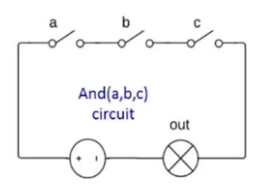CHIP And {
IN a, b;
OUT out;
PARTS:
// Put your code here:
Nand(a=a, b=b, out=c);
Not(in=c, out=out);
}
CHIP And16 {
IN a[16], b[16];
OUT out[16];
PARTS:
// Put your code here:
And(a=a[0], b=b[0], out=out[0]);
And(a=a[1], b=b[1], out=out[1]);
And(a=a[2], b=b[2], out=out[2]);
And(a=a[3], b=b[3], out=out[3]);
And(a=a[4], b=b[4], out=out[4]);
And(a=a[5], b=b[5], out=out[5]);
And(a=a[6], b=b[6], out=out[6]);
And(a=a[7], b=b[7], out=out[7]);
And(a=a[8], b=b[8], out=out[8]);
And(a=a[9], b=b[9], out=out[9]);
And(a=a[10], b=b[10], out=out[10]);
And(a=a[11], b=b[11], out=out[11]);
And(a=a[12], b=b[12], out=out[12]);
And(a=a[13], b=b[13], out=out[13]);
And(a=a[14], b=b[14], out=out[14]);
And(a=a[15], b=b[15], out=out[15]);
}
CHIP DMux {
IN in, sel;
OUT a, b;
PARTS:
// Put your code here:
Not(in=sel, out=notsel);
And(a=in, b=notsel, out=a);
And(a=sel, b=in, out=b);
}
CHIP DMux4Way {
IN in, sel[2];
OUT a, b, c, d;
PARTS:
// Put your code here:
// NOTE [0000] -> [3210]
DMux(in=in, sel=sel[1], a=pa, b=pc);
DMux(in=pa, sel=sel[0], a=a, b=b);
DMux(in=pc, sel=sel[0], a=c, b=d);
}
CHIP DMux8Way {
IN in, sel[3];
OUT a, b, c, d, e, f, g, h;
PARTS:
// Put your code here:
DMux4Way(in=in, sel=sel[1..2], a=pa, b=pc, c=pe, d=pg);
DMux(in=pa, sel=sel[0], a=a, b=b);
DMux(in=pc, sel=sel[0], a=c, b=d);
DMux(in=pe, sel=sel[0], a=e, b=f);
DMux(in=pg, sel=sel[0], a=g, b=h);
}
CHIP Mux {
IN a, b, sel;
OUT out;
PARTS:
// Put your code here:
And(a=sel, b=b, out=selandb);
Or(a=selandb, b=a, out=selandbanda);
Not(in=sel, out=notsel);
And(a=notsel, b=a, out=notselanda);
Or(a=notselanda, b=b, out=notselandaorb);
And(a=selandbanda, b=notselandaorb, out=out);
}
CHIP Mux16 {
IN a[16], b[16], sel;
OUT out[16];
PARTS:
// Put your code here:
Mux(a=a[0], b=b[0], sel=sel, out=out[0]);
Mux(a=a[1], b=b[1], sel=sel, out=out[1]);
Mux(a=a[2], b=b[2], sel=sel, out=out[2]);
Mux(a=a[3], b=b[3], sel=sel, out=out[3]);
Mux(a=a[4], b=b[4], sel=sel, out=out[4]);
Mux(a=a[5], b=b[5], sel=sel, out=out[5]);
Mux(a=a[6], b=b[6], sel=sel, out=out[6]);
Mux(a=a[7], b=b[7], sel=sel, out=out[7]);
Mux(a=a[8], b=b[8], sel=sel, out=out[8]);
Mux(a=a[9], b=b[9], sel=sel, out=out[9]);
Mux(a=a[10], b=b[10], sel=sel, out=out[10]);
Mux(a=a[11], b=b[11], sel=sel, out=out[11]);
Mux(a=a[12], b=b[12], sel=sel, out=out[12]);
Mux(a=a[13], b=b[13], sel=sel, out=out[13]);
Mux(a=a[14], b=b[14], sel=sel, out=out[14]);
Mux(a=a[15], b=b[15], sel=sel, out=out[15]);
}
CHIP Mux4Way16 {
IN a[16], b[16], c[16], d[16], sel[2];
OUT out[16];
PARTS:
// Put your code here:
Mux16(a=a, b=b, sel=sel[0], out=pa);
Mux16(a=c, b=d, sel=sel[0], out=pc);
Mux16(a=pa, b=pc, sel=sel[1], out=out);
}
CHIP Mux8Way16 {
IN a[16], b[16], c[16], d[16],
e[16], f[16], g[16], h[16],
sel[3];
OUT out[16];
PARTS:
// Put your code here:
Mux4Way16(a=a, b=b, c=c, d=d, sel=sel[0..1], out=pa);
Mux4Way16(a=e, b=f, c=g, d=h, sel=sel[0..1], out=pb);
Mux16(a=pa, b=pb, sel=sel[2], out=out);
}
CHIP Not {
IN in;
OUT out;
PARTS:
// Put your code here:
Nand(a=in, b=in, out=out);
}
CHIP Not16 {
IN in[16];
OUT out[16];
PARTS:
// Put your code here:
Nand(a=in[0], b=in[0], out=out[0]);
Nand(a=in[1], b=in[1], out=out[1]);
Nand(a=in[2], b=in[2], out=out[2]);
Nand(a=in[3], b=in[3], out=out[3]);
Nand(a=in[4], b=in[4], out=out[4]);
Nand(a=in[5], b=in[5], out=out[5]);
Nand(a=in[6], b=in[6], out=out[6]);
Nand(a=in[7], b=in[7], out=out[7]);
Nand(a=in[8], b=in[8], out=out[8]);
Nand(a=in[9], b=in[9], out=out[9]);
Nand(a=in[10], b=in[10], out=out[10]);
Nand(a=in[11], b=in[11], out=out[11]);
Nand(a=in[12], b=in[12], out=out[12]);
Nand(a=in[13], b=in[13], out=out[13]);
Nand(a=in[14], b=in[14], out=out[14]);
Nand(a=in[15], b=in[15], out=out[15]);
}
CHIP Or {
IN a, b;
OUT out;
PARTS:
// Put your code here:
Not(in=a, out=nota);
Not(in=b, out=notb);
Nand(a=nota, b=notb, out=out);
}
CHIP Or16 {
IN a[16], b[16];
OUT out[16];
PARTS:
// Put your code here:
Or(a=a[0], b=b[0], out=out[0]);
Or(a=a[1], b=b[1], out=out[1]);
Or(a=a[2], b=b[2], out=out[2]);
Or(a=a[3], b=b[3], out=out[3]);
Or(a=a[4], b=b[4], out=out[4]);
Or(a=a[5], b=b[5], out=out[5]);
Or(a=a[6], b=b[6], out=out[6]);
Or(a=a[7], b=b[7], out=out[7]);
Or(a=a[8], b=b[8], out=out[8]);
Or(a=a[9], b=b[9], out=out[9]);
Or(a=a[10], b=b[10], out=out[10]);
Or(a=a[11], b=b[11], out=out[11]);
Or(a=a[12], b=b[12], out=out[12]);
Or(a=a[13], b=b[13], out=out[13]);
Or(a=a[14], b=b[14], out=out[14]);
Or(a=a[15], b=b[15], out=out[15]);
}
CHIP Or8Way {
IN in[8];
OUT out;
PARTS:
// Put your code here:
Or(a=in[0], b=in[1], out=p1);
Or(a=p1, b=in[2], out=p2);
Or(a=p2, b=in[3], out=p3);
Or(a=p3, b=in[4], out=p4);
Or(a=p4, b=in[5], out=p5);
Or(a=p5, b=in[6], out=p6);
Or(a=p6, b=in[7], out=out);
}
CHIP Xor {
IN a, b;
OUT out;
PARTS:
// Put your code here:
Not(in=a, out=nota);
Not(in=b, out=notb);
And(a=nota, b=b, out=notaandb);
And(a=a, b=notb, out=aandnotb);
Or(a=notaandb, b=aandnotb, out=out);
}
|
